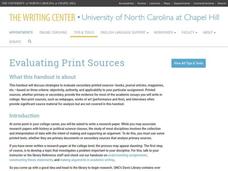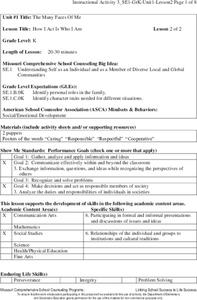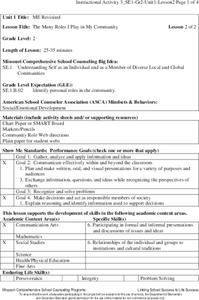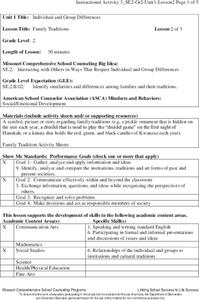Curated OER
Get Set For College
Students apply research skills to obtain information on training and education requirement for post-secondary requirements. They complete a scavenger hunt, complete a checklist and a college comparison worksheet.
Curated OER
How Does a Friend Act?
Students brainstorm a list of characteristics that friends should and should not have. In groups, they are given a set of hand puppets in which they role-play different scenerios in front of the class. To end the lesson, they are shown...
Arizona Department of Education
Be Independent / Life Management Skills
Living independently is about more than managing money. Learn how to manage time, balance responsibilities, and calculate overtime and income with a set of activities about life management skills.
University of North Carolina
Evaluating Print Sources
Not all sources are created equal, so how do you evaluate them? Writers learn how to evaluate print sources based on elements such as audience, tone, and argument in the sixth handout of 24 in the Writing the Paper series from the...
Missouri Department of Elementary
Happy, Sad, Scared and Mad: All Belong To Me
"What are feelings?" and "Why are feelings important to understand?" are the essential questions of a lesson that boosts self-awareness. Scholars discuss the four basic emotions—happy, sad, scared, and mad—in preparation for a creative...
Missouri Department of Elementary
How I Act Is Who I Am
A lesson centers itself around the topic of family roles. A whole-class discussion uses puppets and posters to go in-depth into the following character traits; caring, responsibility, respect, and cooperation. The discussion closes with...
Missouri Department of Elementary
Character Clovers
Build a classroom community with a lesson that uses character clovers to examine scholars' roles. Following a whole-class discussion, participants list four roles they play and accompany it with the character traits that go along with it.
Missouri Department of Elementary
The Many Roles I Play in My Community
Small groups brainstorm their roles in the community. Then, individually, complete a community roles web worksheet. Peers share their completed product and extend the conversation to include the feelings and character traits that go...
Missouri Department of Elementary
Goldilocks Revisited
After a read-aloud of the story Goldielocks and the Three Bears, scholars gather into small groups to answer a series of questions. Peers examine the idea of smart decisions and identify three feelings of characters alongside three...
Missouri Department of Elementary
An Apple a Day
Three apples—green, red, and rotten—exemplify character traits, negative and positive. Following a discussion about the classroom community, scholars complete an apple-themed worksheet that challenges them to read each trait, color it...
Missouri Department of Elementary
What Color is Your Apple?
Build your classroom community with an activity that uses apples to examine oneself and their classmates. Participants draw four large apples on blank paper then exchange them within a small group. Group members write a character trait...
Missouri Department of Elementary
I’m A Star!
A lesson encourages scholars to be star community members. Pupils take part in a class discussion that challenges them to brainstorm at least two ways to show responsibility within one's community. Small groups play a game in which...
Missouri Department of Elementary
I’m Thumbody!
Positive and negative thinking is the focus of a lesson that boost self-awareness. Beginning with a whole-class discussion, scholars brainstorm what positive thinking looks and sounds like then compares and contrast the two types of...
Missouri Department of Elementary
Finding the Positive
To instill the importance of a positive classroom community small groups create a collage out of magazine clippings that highlight three characteristics of self-awareness. Written examples accompany the finished product. Groups turn in...
Missouri Department of Elementary
Are You Balanced?
Balance scales create a strong visual of how an individual prioritizes one's self alongside their commitments to the community, school, and home. Scholars complete a graphic organizer then discuss their findings with their peers. A...
Missouri Department of Elementary
So Much to Do, So Little Time: How Do I Tie All of the Loose Ends Together?
How do people manage to get everything done when there are so few hours in a day? Scholars explore the question as they participate in small group discussions about time management. They construct a daily schedule and complete a...
Missouri Department of Elementary
What Is Important to Me?
Pupils complete an activity sheet to determine what values are most important to them. They then discuss their responses with partners before sharing the results of the discussion with the class.
Missouri Department of Elementary
My Problem…Your Problem…Our Problem
Encourage sixth graders to take responsibility for their actions and become a problem solver. Pupils discuss new problems faced in sixth grade then identify ones that involve other people. A worksheet guides their practice in conflict...
Missouri Department of Elementary
Respect: Looks Like, Sounds Like, Feels Like
Respect is the focus of a lesson designed to encourage social awareness. Following a whole-class discussion, scholars list what they believe respect looks, sounds, and feels. Pupils turn their new-found knowledge into a plan of action....
Missouri Department of Elementary
Acting Out Respect and Compromise
Puppets showcase the importance of being a good friend. Following a discussion about positive character traits, scholars create a paper-bag puppet and role-play scenarios with a peer.
Missouri Department of Elementary
Family Traditions
Honor family traditions with a instructional activity that examines the variety of winter celebrations. Class members discuss their family's traditions then complete a cut-and-paste practice page in which they match a picture to the name...
Missouri Department of Elementary
Be a Problem Solving Star
Encourage scholars to problem solve everyday frustrations using the STAR method. Using the acronym, learners remember to stop, think, act, and review. Participants begin with a math analogy in which they problem-solve to find the correct...
Missouri Department of Elementary
Acting Out Respect
Bert and Ernie, Lucy and Ethel ... what makes a great friend? Pupils first learn about the STAR method of problem solving: Stop, Think, Act, Review. Small groups then role play various scenarios to demonstrate respect and compromise in...
Missouri Department of Elementary
Friendship Line Dancing
Develop social awareness with a instructional activity that challenges scholars to properly communicate with their peers. Standing in two lines, participants practice introducing themselves, asking how their partner is feeling, asks if...

























